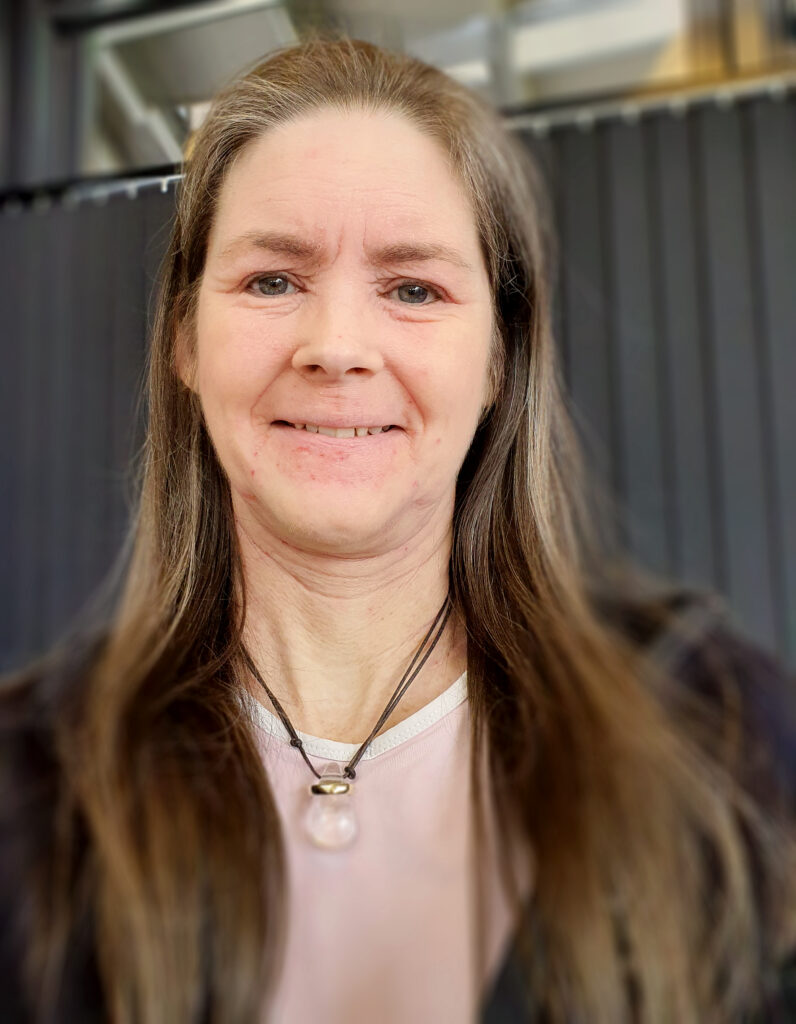
Meet Irene, age 48, who was diagnosed with atopic dermatitis (eczema) when she was five years old
Almost her entire life, Irene has suffered from eczema as she was diagnosed with atopic dermatitis (AD) when she was five. At the same age she was also diagnosed with different types of allergies (horse, dog and cat) and later in life also birch pollen, grass etc. Back then, the main treatment option in Denmark was tar baths. She went to the hospital every second months to lay in a bathtub with tar. Afterwards, the doctors and nurses wrapped her in gauze and gave her a set of hospital clothes to put on top which she had to wear for two days. Irene had to wear the clothes 24/7 and thus also when going to school. This experience has affected her for life and Irene can still today smell from a very long distance if roads are being repaired with tar. The tar bath did have a positive effect on Irene’s skin but after a couple of years she switched to other types of treatment as the tar baths were very time consuming.
Trying different types of treatment
In her 20’s, Irene received UV treatment, first UVB for six months and thereafter UVA, for two years. UVA treatment (PUVA) is a combination of biologics as well as UV lightning which is only offered at specialized hospitals. This was a very successful treatment and the only treatment which made her eczema almost completely disappear why Irene decided to stop treatment. However, after some time the eczema occurred again, and she went back to treatment with hormone creams. It was not possible for Irene to go back on UV treatment as she had moved and was hereby living far away from a hospital providing PUVA treatment.
Irene has tried many different types of cream but especially hormone/steroid creams as well as biological treatments. The dermatologists have prescribed different types of hormone cream during the years and very few of them have had a positive influence on her eczema for more than six months. Irene has experienced many side effects from both the different hormone creams and the biological treatments that she has tried. Eventually, the side effects were too severe. She could not continue living her life with all the side effects. Therefore, she decided to radically change her lifestyle by stopping eating gluten and sugar, to control the glucose level in the body which tend to make her skin feel itchy and turning red. Moreover, she only wears clothes made of cotton and viscose because materials such as polyester and wool irritate her skin and provoke the eczema. Furthermore, Irene is very mindful of buying products without perfume e.g., washing powder and hair color, as products with perfume also irritates her skin.
The evolvement of the eczema
Over the years, the location of eczema on Irene’s body has changed. Initially, it was mainly in the armpits, back of the knee joint and elbows, but when she became a teenager, it moved to the shoulders and neck, and in her early 20’s and up until today, it has mainly appeared on the hands and in the face (mainly around the eyes).
One can see the eczema on Irene’s body, however, for Irene, the worst part is the itching. At times, the itching is so unbearable that she must take a hard towel to scratch the skin for the itching to disappear. This calms the itching for a couple of minutes, but the itching tends to come back and leave her with frays and cracks in the skin as well as an inflammation.
At times, when her eczema is in outbreak, it negatively influences her mind and lowers her energy level. When Irene has experienced some of her “big life moments”, for example falling in love, becoming a mother, or getting married, her state of mind has resulted in more severe eczema outbreaks covering the whole body and the itching worsening as well.
” At times, I can be very frustrated about having atopic dermatitis e.g., when the itching is severe, and the skin is frayed and one cannot live life as all other people”.
Her family, friends and colleagues are very supportive, and she is doing her best not to let it negatively influence her life. She acknowledges that many people are suffering from more severe instances than herself.
“It is important to keep a positive state of mind, taking care of oneself and not letting the atopic dermatitis dictate ones live. Having atopic dermatitis is not something one should be ashamed about”.
Today, Irene is not using any prescription medication, for example hormone cream, due to the long-term side effects such as thin and more delicate skin. She is resistant to ointment, and cream with mineral oils. Due to all the side effects associated with eczema treatments available today, she is hesitant to try out new treatments, however, if a treatment with very few and less severe side effects become available, she would be interested in trying it out.

